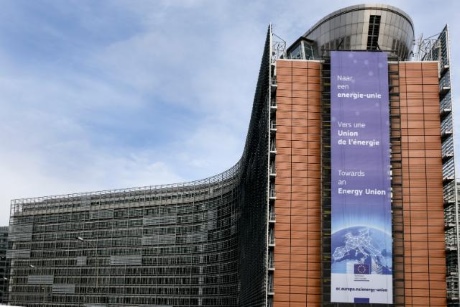The 28 member states of the European Union are to integrate their markets and increase security of supply under a policy set known as the Energy Union. Investments of €200 billion ($227 billion) per year are expected over the next decade.
The Energy Union is a flagship project of the new president of the European Commission Jean-Claude Juncker, whose vice president Maroš Šefčovič is in charge of achieving the Energy Union goals.
Documents announcing the strategic framework for the project said: "Today the European Union has energy rules set at the European level, but in practice it was 28 national regulatory frameworks. This cannot continue."
 |
| The European Commission dressed its office building with an Energy Union banner |
"Our vision is of an integrated continent-wide energy system where energy flows freely across borders, based on competition and best possible use of resources, and with effective regulation of energy markets at EU level where necessary."
Assuming an 'energy transition' for the EU, the Energy Union would see "citizens take ownership" through smart meters, domestic generation, and by taking their choice of energy suppliers from across the entire EU.
First must come large changes in infrastructure, such as electricity transmission between countries to ensure each country has capacity to import 10% of its electricity needs by 2020. Next is the completion of the internal market on energy. But further, markets must be expanded so that consumers have the choice to source their energy from any supplier in the EU. To achieve this, the regulators of each country's market will in effect be regulated.
The EU wants at least 30% of energy to come from renewable sources by 2030 and international transmission is important to facilitate this. In addition the EU will accelerate the deployment of smart meters so that consumers can 'moderate' their demand in times of lower supply, or when prices rise.
"Market integration of renewable electricity generation requires flexible markets, both on the supply and demand side, within and beyond a member state's borders," said the European Commission. "There is a need to expand the possibilities for distributed generation and demand-side management, including intraday markets, to develop new high-voltage long distance connections and new storage technologies." It concluded, "The Commission will prepare an ambitious legislative proposal to redesign the electricity market linking wholesale and retail."
In terms of energy security, the main issue is the supply of gas and its pricing and these are a major driver behind the entire exercise. A 'comprehensive LNG strategy' was promised, to look into access points, transport and storage, particularly considering winter need for the fuel.
Euratom
All 28 European Union member states are party to the Euratom Treaty in which they pledge to "create the conditions required for the development of a powerful nuclear industry which will provide extensive supplies of energy, lead to the modernisation of technical processes and in addition have many other applications contributing to the well-being of their peoples."
Part of the Energy Union program complies with a Euratom clause and will see a communication come this year on "production targets for nuclear energy and the various types of investment required for their attainment." Originally these reports were intended to provide information to investors pursuant to the Euratom goal but now, unfortunately, some signatory countries would prefer a nuclear production target of zero.
Nuclear power was barely mentioned in today's documents, despite being the EU's largest low-carbon source at about 27% of electricity and a major contributor to energy security. A need to increase diversity of supply in nuclear fuel and services was highlighted in the light of much nuclear fuel and services being imported. And the documents noted that Europe had "lost ground [compared to other parts of the world] when it comes to some clean, low-carbon technologies."
Externally, the EC wants to "project its weight" and "speak with one voice" in energy negotiations. It wants all bilateral oil and gas import deals to comply fully with EU law; and it will "pursue an active trade and investment agenda in the energy field, including access to foreign markets for European energy technology and services."
On research, innovation and competitiveness, the focus was again on renewables and a desire to "be the world number one." However, the next paragraph stated, "Equally, putting the EU at the forefront of smart grid and smart home technology, clean transport, as well as clean fossil fuel and the world's safest nuclear generation, is central to the aim of turning the Energy Union into a motor of growth, jobs and competitiveness."
Researched and written
by World Nuclear News







_94566.jpeg)






